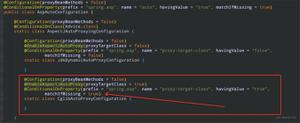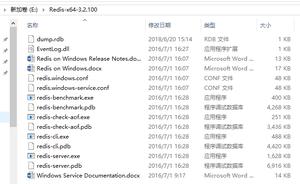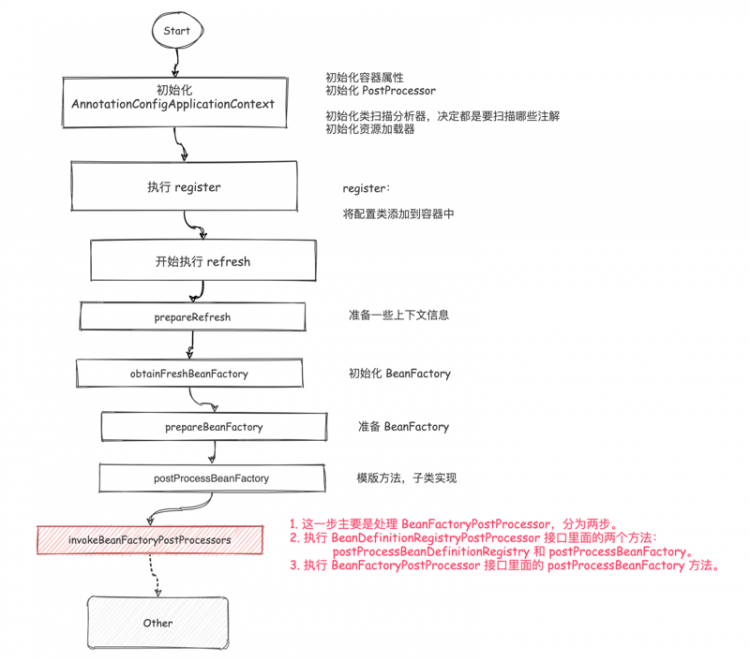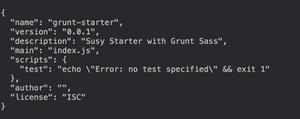Spring事务03AbstractPlatformTransactionManager

挑几个常见的实现类,Spring 事务管理重要的是 DataSourceTransactionManager 。
/** * Abstract base class that implements Spring"s standard transaction workflow,
* serving as basis for concrete platform transaction managers like
* {@link org.springframework.transaction.jta.JtaTransactionManager}.
*
* <p>This base class provides the following workflow handling:
* <ul>
* <li>determines if there is an existing transaction;
* <li>applies the appropriate propagation behavior;
* <li>suspends and resumes transactions if necessary;
* <li>checks the rollback-only flag on commit;
* <li>applies the appropriate modification on rollback
* (actual rollback or setting rollback-only);
* <li>triggers registered synchronization callbacks
* (if transaction synchronization is active).
* </ul>
*
* <p>Subclasses have to implement specific template methods for specific
* states of a transaction, e.g.: begin, suspend, resume, commit, rollback.
* The most important of them are abstract and must be provided by a concrete
* implementation; for the rest, defaults are provided, so overriding is optional.
*
* <p>Transaction synchronization is a generic mechanism for registering callbacks
* that get invoked at transaction completion time. This is mainly used internally
* by the data access support classes for JDBC, Hibernate, JPA, etc when running
* within a JTA transaction: They register resources that are opened within the
* transaction for closing at transaction completion time, allowing e.g. for reuse
* of the same Hibernate Session within the transaction. The same mechanism can
* also be leveraged for custom synchronization needs in an application.
*
* <p>The state of this class is serializable, to allow for serializing the
* transaction strategy along with proxies that carry a transaction interceptor.
* It is up to subclasses if they wish to make their state to be serializable too.
* They should implement the {@code java.io.Serializable} marker interface in
* that case, and potentially a private {@code readObject()} method (according
* to Java serialization rules) if they need to restore any transient state.
*
* @author Juergen Hoeller
* @since 28.03.2003
* @see #setTransactionSynchronization
* @see TransactionSynchronizationManager
* @see org.springframework.transaction.jta.JtaTransactionManager
*/
@SuppressWarnings("serial")
public abstract class AbstractPlatformTransactionManager implements PlatformTransactionManager, Serializable {
/**
* Return a transaction object for the current transaction state.
* 返回当前事务状态的事务对象
*/
protected abstract Object doGetTransaction() throws TransactionException;
/**
* Begin a new transaction with semantics according to the given transaction definition.
* 根据给定的事务定义使用语义开始一个新的事务
*/
protected abstract void doBegin(Object transaction, TransactionDefinition definition) throws TransactionException;
/**
* Perform an actual commit of the given transaction.
* 执行给定事务的实际提交
*/
protected abstract void doCommit(DefaultTransactionStatus status) throws TransactionException;
/**
* Perform an actual rollback of the given transaction.
* 执行给定事务的实际回滚
*/
protected abstract void doRollback(DefaultTransactionStatus status) throws TransactionException;
}
翻译如下:
实现了Spring标准事务工作流的抽象基类,作为具体平台事务管理器的基础,如{@link org.springframework.transaction.jta.JtaTransactionManager}。
这个基类提供了以下的工作流程处理:
1 确定是否存在现有事务;
2 应用合适的传播行为;
3 在必要时暂停并恢复事务;
4 在提交时检查仅回滚标志;
5 在回滚时应用了适当的修改(实际回滚或只设置回滚);
6 触发注册的同步回调(如果事务同步是活动的)。
子类必须实现特定的模板方法事务的状态,例如:begin(开始)、suspend(暂停)、resume(恢复)、commit(提交)、rollback(回滚)。
其中最重要的是抽象的,必须由具体的子类来提供实现;对于其余部分,则提供默认值,因此覆盖是可选的。
事务同步是注册回调的通用机制
在事务完成时调用。这主要用于内部
由数据访问支持类JDBC、Hibernate、JPA等运行时
在JTA事务中:它们注册在
在事务完成时关闭的事务,例如允许重用
事务中的相同Hibernate会话。同样的机制可以
也可用于应用程序中的自定义同步需求。
这个类的状态是可序列化的,允许序列化
事务策略以及携带事务拦截器的代理。
如果子类希望它们的状态也是可序列化的,则由子类决定。
它们应该实现{@code java.io。序列化}标记接口
在这种情况下,可能会有一个私有的{@code readObject()}方法(根据到Java序列化规则),如果他们需要恢复任何瞬态状态。
以上是 Spring事务03AbstractPlatformTransactionManager 的全部内容, 来源链接: utcz.com/z/513282.html








